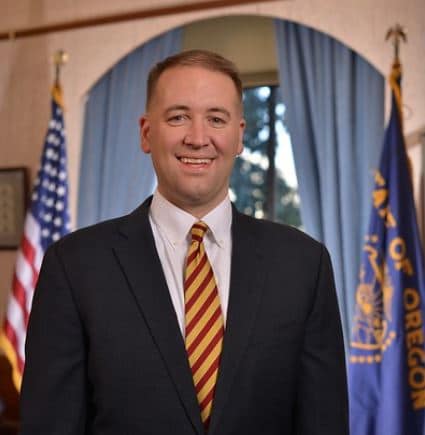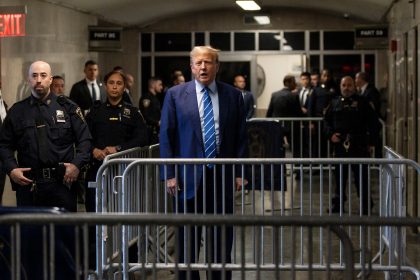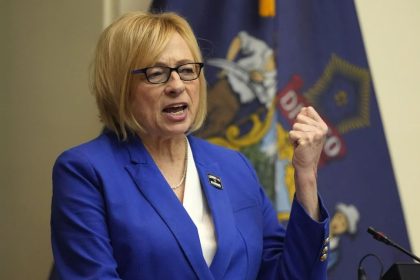Oregon’s Read Is Steeped In Public Service, Embracing Opportunities

Tobias Read chuckled.
The Oregon state treasurer wasn’t long into a conversation when his caller asked why it is that his colleagues in government speak so highly of him.
After a self-effacing pause, Read said he’s just been lucky.
“I was lucky enough to have parents who really made service a priority and who made it clear, early on, that I had some responsibility to others,” he said.
“The thing is, I found I really liked public service … so it’s worked out,” Read said.
Born in Montana and raised in Idaho, Read, who is in his first term as state treasurer after a decade in the Oregon legislature, said throughout his childhood his parents frequently reminded him that the schools he attended, and the library he studied in, and the soccer leagues he played in were not things that happened spontaneously.
“I was raised with a sense that all these things were the result of those who had come before me and who had, without ever knowing, invested in my future,” he said.
“That’s how my parents instilled that sense of responsibility I mentioned earlier. Someone had created these things, these opportunities, for me, and I had a duty to do the same for the generation after me,” he added.
Read said given that grounding, it was inevitable that by high school he’d settled on a vision of himself as someone whose adult life would have an element of public service to it.
And even before he graduated high school, politics had entered the picture in the guise of working on the 1992 Clinton/Gore presidential campaign.
His appetite whetted by the experience, Read would continue working on state, local and federal campaigns after he moved to Salem, Oregon to attend Willamette University, from which he earned a bachelor’s degree in politics and economics in 1997. He later attended the University of Washington, from which he earned a master’s degree in business administration.
“I think what I took away from those experiences, particularly the Clinton/Gore campaign, was a sense of how things worked,” Read said. “I also realized that was what I found most interesting was the stuff that happened at the intersection of the public and private sector.”
Still, he said, he was a long way from becoming a candidate himself.
“My interest at that point was just to keep working on political campaigns. I was the guy who constantly told people, ‘I’m inexpensive and I’m interested in learning,’” he said.
The turning point for Read came during his senior year at Willamette University. It was then that Read landed what he described as “a significant internship,” spending the fall managing a legislative campaign for a Democratic candidate, a professional mediator named Bryan Johnston, in a district where Republicans had a significant registration advantage.
“We won by seven points,” Read said with pride.
The victory led to a as an aide to Johnston. Later, from 1999 to 2001, he served as an aide to then-Treasury Secretary Lawrence Summers.
But it was while working for Johnston that Read finally began thinking of governing in a context distinct from campaigning.
“The thing about being involved in something local, as opposed to the national campaigns I was involved with, is that you really see that states, as U.S. Supreme Court Justice Louis Brandeis said, are the ‘laboratories of Democracy.’
“Working with [state] Representative Johnston really drove that home,” Read said. “Because of the way he approached everything, you really could see how important state and local government is, how much you can do on a smaller scale, and how local government can serve as an incubator of new approaches and new solutions.”
As it happened, Read was thinking of these lessons when he finished business school and was heading back to Oregon to take a job in footwear development at Nike, Inc.
“I can remember picking up this book and one of the things it said was that it was important to take entrepreneurial risks early in your career — if only to prove to yourself that you can recover from a risk that didn’t work out,” he said. “So I had all these things in my head, and suddenly, the opportunity to run for the Oregon state legislature came up.
“I wasn’t married at the time, I didn’t have kids, and I said to myself, ‘if I’m ever going to do it, now is the time.'”
Read ran for and won a seat in the Oregon House of Representatives in 2006, and would serve in the chamber until 2017, though he quickly points out he won that first race by just 86 votes.
It was during these years that he became a member of NewDEAL, a national network of pro-growth state and local Democratic officials who not only taking innovative steps to nurture their local economies, but are doing so in ways intended to expand opportunity for all and make government work better.
He also received an Aspen Institute-Rodel Fellowship in Public Leadership which enabled him to get together with other young and promising political leaders to explore the underlying values and principles of western democracy.
“We fool ourselves thinking there are new issues out there,” Read said. “What the fellowship taught me, through things like reading Plato and John Stuart Mill and the Dr. Rev. Martin Luther King, Jr., is that there are no new issues. There are only the same fundamental human tensions, and that only the specifics change.
Somewhat amazingly, for many of his years in the Oregon legislature, Read also continued to work at Nike.
In part, he admitted, it was because Oregon is still a bastion of the citizen legislature.
“Full time work, for sure, though the pay definitely wasn’t,” he explained.
But in addition to that, he found that continuing to work at Nike exposed him to real-world perspectives he could bring to his work as a legislator.
“My job at Nike wasn’t in the glamorous end of the business,” he said. “I had to figure out how to get the shoes made and how to negotiate and navigate between the designers and the marketers and the factories, and believe it or not, that was great preparation for policy making, where you have to figure out what the real priorities are, what the tradeoffs are, and try to take into account the different ways of looking at solutions.”
Eventually, Read rose to the positions of Speaker Pro Tempore and the Democratic Majority Whip of the legislature. He said the big lesson he learned in those roles was the importance of listening, “and to listen not for what you are hoping to hear, but for what’s really there.”
“For instance, as Democratic Whip, one of the big jobs was counting votes and for you to do that job well, you can’t engage in what I call, ‘wishful listening,'” he said. “Whether you’re trying to pass a bill or defeat a bill, it’s important, in a very direct way, to really listen to what your individual members are saying and to not ask them leading questions to get the answers you want to hear.”
Read said being part of a relatively small government body — the Oregon House has just 60 members — also taught him important lessons about bipartisanship.
“The reality is, you can find something to agree on with almost everyone, and generally speaking, the Oregon House is small enough that you know everybody by name, or at least by face, and you quickly get a sense of what they care about.”
“I think one of the mistakes people make in politics is jumping into discussions on policy by focusing on the things we disagree on,” Read said. “Things go better, and it’s a lot more productive, when we step back and focus on the root values, the common things that unite us at the base of every issue.”
“If you can scale back to those values, it becomes a lot harder to argue,” he added.
From the very beginning of his tenure in the Oregon legislature, Read exhibited a passion for fiscal and budgetary matters, and the welfare of children and the elderly.
All these things came into sharper focus after his marriage to his wife, Heidi, on New Year’s Eve 2007, and the subsequent births of his children, Annika and Ellis, who he says are “constant reminders of why all this matters.”
It’s wasn’t surprising then when Read said two of his proudest accomplishments in the Oregon House were related to the welfare of children and families.
The first was changing the state’s school-funding formula to pay for all-day kindergarten.
“Until we got that done, the state only reimbursed school districts for half-day programs, so while some of the bigger districts offered all-day kindergartens, many of our smaller districts simply couldn’t do so,” he said.
The other program Read points to is Oregon Saves, which allows low-income and working class families to open individual retirement accounts even if their employer doesn’t offer such a benefit.
“That was the last bill I worked on in the legislature, and in the year-and-a-half that we’ve made it available, we’ve had more than 30,000 people open IRAs, saving a collective $17 million to date,” Read said.
“But more important than all those numbers is the impact Oregon Saves has had on how people think about their future,” he said. “The people who take advantage of this program are often working in relatively low-paying jobs, struggling, and you see their eyes light up when they say ‘I can see myself getting ahead. There’s a path forward for me.”
“That’s the embodiment of what we want for friends and our neighbors, to be in control of their financial futures and build the life they wanted,” he added.
Despite the fulfillment he felt in being a legislator, in 2016, Read decided to run to succeed then-State Treasurer Ted Wheeler when the incumbent was barred from seeking re-election by term limits.
Read won the general election on November 8, 2016, and became the state treasurer in January 2017.
Of his decision to change roles, Read said “while I felt like I learned a lot in the legislature and had done a lot I was proud of, there definitely is a difference in being state treasurer. In the House, we propose ideas and pass them, and we do perform an oversight role, but this was the chance to take the next step — not just passing laws, but actually implementing them.”
Read said he’s running for re-election as state treasurer in 2020, but demurred when asked what he will do, assuming he’s re-elected, when he’s term-limited four years later.
“All I can say with 100 percent certainty is that I want an element of public service in whatever I do,” he said.
“One of the biggest lessons I’ve learned in politics is the fastest way to be disappointed is to have a very specific plan,” he continued. “I played basketball in high school, and I still sometimes draw comparisons between basketball and politics.
“The way I see it, the best thing I can do is hang around the basket and be prepared in case the ball falls my way. All you can do in life is be ready to embrace the opportunities that come your way,” Read said.























